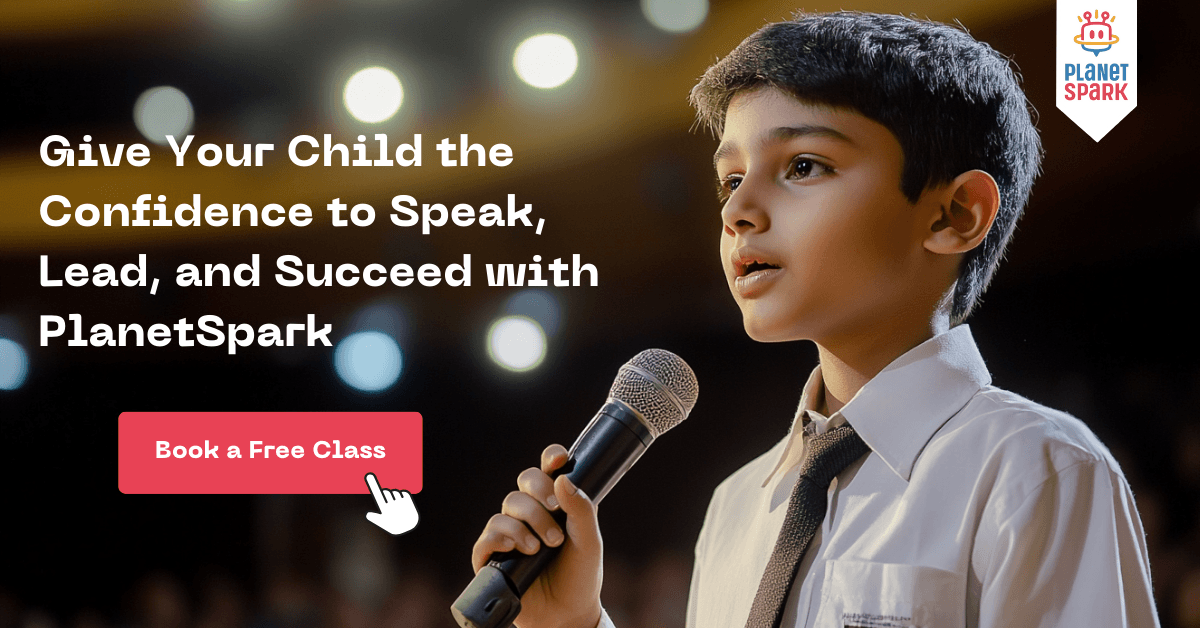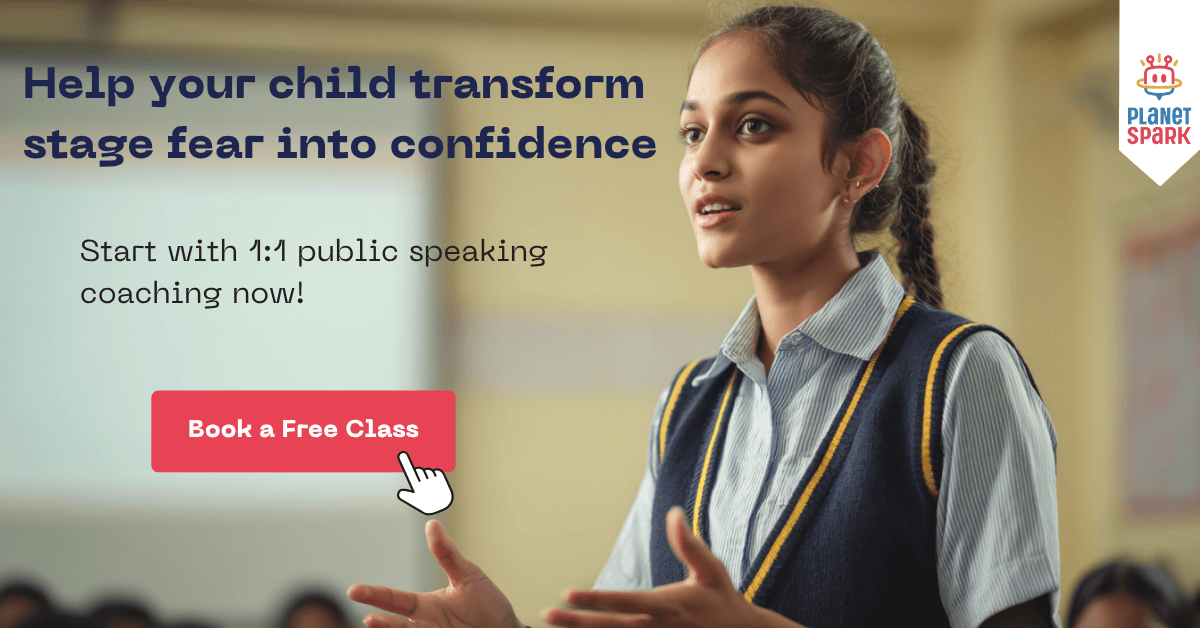Education Speech Topics for Class 3 | Ideas & Tips

Table of Contents
- Top Education Speech Topics for Class 3
- Sample Speech: Persuasive: “Importance of Girls’ Education”
- Sample Speech: Informative: “Benefits of Inclusive Education
- How to Choose the Right Topic for Class 3
- Writing Tips for Class 3 Speeches
- Building Public Speaking Skills Through Practice
- How PlanetSpark Supports Young Speakers
- FAQ: Common Questions
- Final Thoughts
A well-chosen topic and thoughtful delivery can help Class 3 students shine on stage. This guide brings you engaging education speech topics designed for young learners, sample speeches, and clear practices to boost public speaking confidence through PlanetSpark’s expert coaching.
What Makes a Great Education Speech for Class 3?
A strong Class 3 speech topic is simple, relatable, and encourages understanding. This guide provides persuasive and informative topic ideas, full sample speeches, and practical tips to help children deliver with clarity and confidence.
Why this guide works
Topic lists organized by intent (persuasive vs informative)
Full sample speeches tailored to Class 3 level
Step-by-step writing and speaking guidance
Links to PlanetSpark’s Speech Writing and Public Speaking programs
“Ready to help your child speak confidently? Explore PlanetSpark’s Speech Writing course with templates and live feedback.”

Top Education Speech Topics for Class 3
Here are well-suited Class 3 speech topics categorized for simpler ideation:
Persuasive Topics
Importance of Education
Creative Learning
Benefits of E-learning
Importance of Physical Activity in School
Importance of Discipline among Children
The Burden of Homework
Should Elementary School Be Free?
Should Computers Be Taught from an Early Stage?
Importance of Girls’ Education
What Are E‑books?
Education System in India
Value of Punctuality
Importance of Extracurricular Activities
Benefits of Inclusive Education
Why Financial Awareness Matters Early
Should Textbooks Be Free?
Importance of Proper Sleep for Students
The Value of Moral Education
Benefits of Group Projects
Why We Should Not Discriminate in the Classroom
Informative Topics
Parents’ Role in Children’s Education
How Education Helps Solve Poverty
Benefits of E‑learning
Role of Computers in Education
Why Picnics Matter for Child Development
Effects of Too Much Homework
Importance of Healthy Debates
Balancing Academics and Sports
School Campus Safety
Why Grades Are Not Everything
Importance of Art in Early Education
Sample Speech: Persuasive: “Importance of Girls’ Education”
Respected Teachers and Friends,
Today, I want to talk about a very important topic, girls’ education. Every child, boy or girl, deserves the chance to learn. But in many places, girls miss out on going to school.
When we educate girls, our community becomes stronger. Girls grow into women who can teach, heal, build businesses, and lead. They support their own families and help break cycles of poverty.
We must all treat girls and boys equally, encouraging them to study, dream, and succeed. Let’s promise to send every girl to school, help her learn, and support her to reach her full potential. Education isn’t just a right, it’s a path to a better world.
Thank you.
Sample Speech: Informative: “Benefits of Inclusive Education”
Good Morning Everyone,
Today I would like to speak on the benefits of inclusive education. Inclusive education means students with different abilities learn together in the same classroom.
When we learn together, we build kindness, understanding, and friendship. Children with special needs get to learn alongside others. That builds their confidence. Everyone learns to respect differences and help each other.
Inclusive classrooms teach us important life values, empathy and teamwork. We learn to share, help, and appreciate everyone’s strengths. That makes our school a happier place.
Inclusive education makes us better learners and better people. Thank you for listening.
“Do these samples inspire you? Check out PlanetSpark’s Speech Writing course for structured templates and live writing sessions.”
How to Choose the Right Topic for Class 3
Age-appropriate and relatable
Choose topics familiar to 8–9-year-olds, school habits, friends, daily routines, or small community topics.Simple yet meaningful
Persuasive topics encourage thinking (e.g., School Uniforms: Good or Bad?). Informative topics teach facts (e.g., Why We Eat Healthy Food).Easy to research and explain
Let children learn facts through reading, asking questions, and classroom discussion.Encourage emotions and action
A persuasive speech should end with a simple take-away, like "Let’s all recycle."
Persuasive vs Informative Topics: What’s the Difference?
| Type | Purpose | Example Topic |
|---|---|---|
| Persuasive | Encourage action or opinion | “Benefits of E‑learning” |
| Informative | Share knowledge and understanding | “How Computers Help in School” |
Typically, Class 3 speeches should be 1–2 minutes long, around 100–150 words.
Writing Tips for Class 3 Speeches
Start with a greeting
“Good morning Respected Teacher and Friends,”Introduce your topic
“Today, I will talk about…”Include two or three points
Simple phrases like “It helps because…”Use a short example
“When I read e‑books, I can learn anytime.”Conclude with a call to action
“Let’s all read e‑books to learn more!”End with thank you
“Thank you for listening.”
“Craving more speech tips? Explore PlanetSpark’s Speech Writing blog for creative examples and delivery secrets.”

Building Public Speaking Skills Through Practice
Writing the speech is the first step. Presenting it with confidence makes a real impact. Here are ideas children can use:
Speak slowly and clearly, looking at classmates.
Practice aloud to reduce nerves.
Smile and use hand gestures to express points.
Play mini audience games at home to build stage confidence.
PlanetSpark’s Public Speaking program helps students rehearse, receive feedback, and polish their delivery skills.
How PlanetSpark Supports Young Speakers
Through our Speech Writing and Public Speaking programs, students learn to:
Write with structure and clarity
Use voice modulation and body language
Overcome stage fright through practice
Develop confidence in expressing ideas
“I want my child to shine on stage!”- parents appreciate how our classes focus on both content and delivery.
FAQ: Common Questions
How long should a Class 3 speech be?
About 1–2 minutes (100–150 words).
Can a 3rd grader write their own speech?
Yes! With a simple structure and examples, they can write and deliver on their own.
How many topics should they choose?
Let them explore 3–5 topics and choose the one they feel excited about.
How can parents help?
Discuss ideas, help research facts, rehearse delivery, and provide encouragement.
Final Thoughts
Choosing the right topic and practicing delivery will help your Class 3 child stand out in front of an audience. Whether they speak persuasively or informatively, what matters is clarity, confidence, and connection.
To give them a real edge, PlanetSpark’s Speech Writing and Public Speaking courses offer tailored guidance, live sessions, and practice tools. They don't just learn to write, they learn to speak with poise and presence.
Ready to see your child transform from shy to stage-ready?
Book a free trial with PlanetSpark and help them make their voice heard.
Personalized Communication Report
Record a video to get a AI generated personalized communication report for your child

Hi There, want to try these
tips for your child with
LIVE with our expert coach?
Let's check your child's
English fluency
